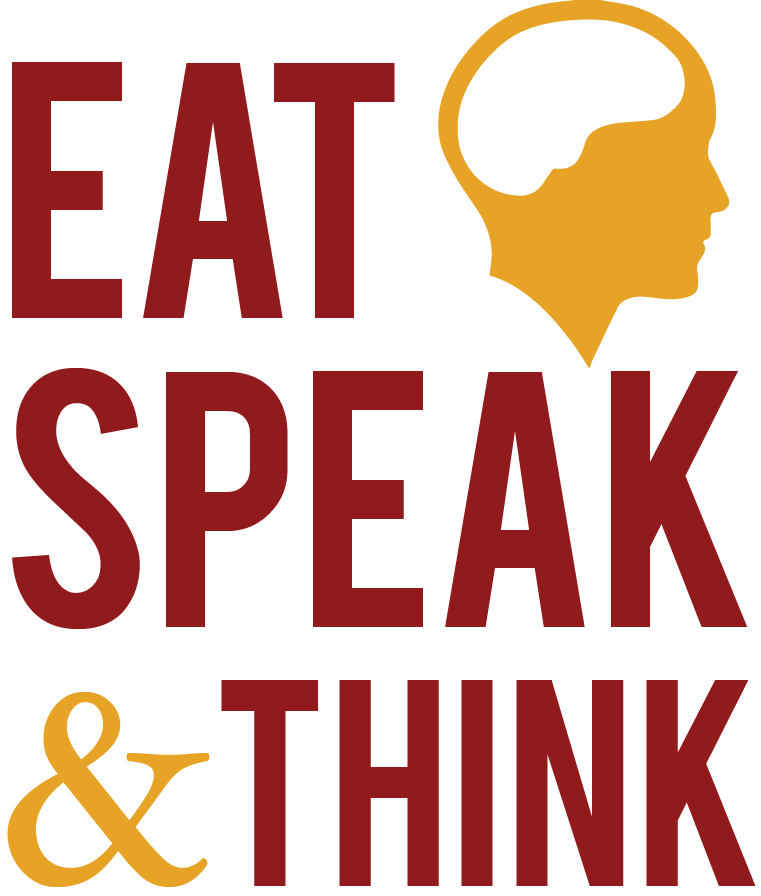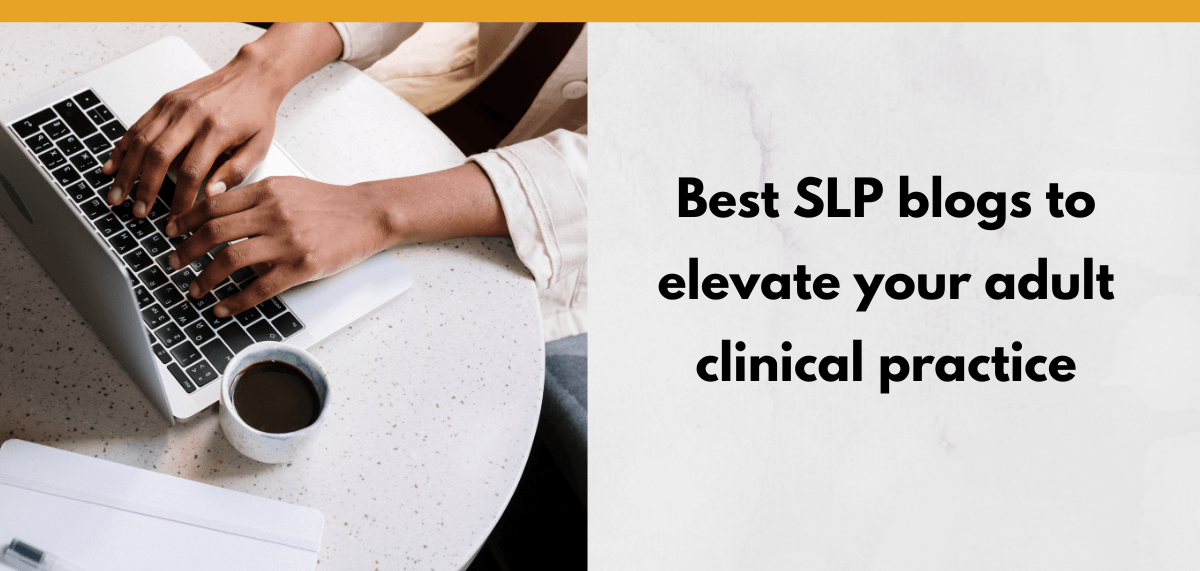Here you’ll find the 20 best SLP blogs written for the adult population. Okay, I’ll ‘fess up and share that these are also the ONLY adult medical speech-language pathology blogs I could find. I’m sure there must be more, so please let me know of any that I’ve missed!
Free DIRECT download: 20 medical SLP blogs (cheat sheet). (Email subscribers get free access to all the resources in the Free Subscription Library.)
a tempo Voice Center
Kristie Knickerbocker (SLP) owns a tempo Voice Center. As you may guess, she specializes in assessing and treating voice problems. She has specialized training in FEES, videostroboscopy, AmpCare, among others.
Check out Kristie’s blog to find tips for voice therapy apps, information on vocal function exercises, stories from the OR, and much more. If you haven’t seen it, Kristie just published Singing in a Jiff: A Guide to Creating Sustainability.*

*This is an Amazon affiliate link. As an Amazon associate, I may earn a small commission on qualifying purchases. There is no extra charge to you, and it will help keep Eat, Speak, & Think sustainable.
Adult Speech Therapy
Chung Hwa Brewer (SLP) and Miwa Aparo (OT) co-founded Adult Speech Therapy, where you can find tips and materials for assessment and treatment of adults. In addition to free articles and materials, she also sells therapy materials and other resources.
Chung Hwa has published The Adult Speech Therapy Workbook*, among other books which are currently out of print.

*This is an Amazon affiliate link. As an Amazon associate, I may earn a small commission on qualifying purchases. There is no extra charge to you, and it will help keep Eat, Speak, & Think sustainable.
ASHA Leader Live
ASHA’s blog pairs with the ASHA Leader magazine, covering adults and pediatrics in both speech pathology and audiology. You’ll also find the current episode of the ASHA Voices podcast highlighted on the main page.
Constant Therapy’s BrainWire
The BrainWire blog is published by Constant Therapy. They publish articles for brain injury survivors, their loved ones, and their clinicians.
Check out their blog to learn how to treat left brain damage, how to use Constant Therapy, tips for caregivers, and much more.
Dysphagia Cafe
Jonathan Waller (SLP) founded Dysphagia Cafe in 2013 to share information about treating swallowing disorders across the lifespan.
Jonathan invites SLP experts to write about various topics. The articles featured on the home page are older, but he is still publishing new articles.
Eat, Speak, & Think
I’m including my own blog here, in case this post is your first introduction to Eat, Speak, & Think. My name is Lisa Young (SLP), and I started this blog in 2018.
My goal is to provide helpful information and resources to adults who are living with challenges with swallowing, communication, or cognition. I have a bi-monthly newsletter, and nearly every article comes with a free download.
Fresh SLP
Mattie Murrey (SLP) writes the Fresh SLP blog. Mattie shares advice for speech-language pathologists, particularly for grad students, CF’s, and new SLPs.
You can learn about specializing in medical speech pathology, how private practice works, and much more.
Geek SLP
Barbara Fernandes (SLP) writes the Geek SLP blog. Well, really, she has much more here. She has a podcast, has created over 50 apps, and has written a book: Sis, You Got This! From Surviving to Thriving as a Minority Speech-Language Pathologist*.

*This is an Amazon affiliate link. As an Amazon associate, I may earn a small commission on qualifying purchases. There is no extra charge to you, and it will help keep Eat, Speak, & Think sustainable.
M.E. the SLP
Marilouise Elizabeth (SLP) is a medical speech-language pathologist working with adults. She writes about diversity in our field and shares her experience on M.E. the SLP’s blog.
Check out this 3-part series on racial and ethic equality that Marilouise wrote for DotCom Therapy.
Neuro Speech Solutions
The Neuro Speech Solutions blog is “written by MedSLPs for MedSLPs.” You can find lots of great information here on topics such as how to secure a medical SLP CF and book recommendations.
You can also find treatment information on a variety of conditions, such as aphasia, cognitive impairment, dysarthria, voice, and dysphagia.
Nice Speech Lady
Wilson Nice (SLP) has a private practice and pens the Nice Speech Lady blog. You can find many informative posts and handouts on the blog.
Some of my favorites are the cognitive-linguistic home programs, where you can find long lists of home activities.
PrAACtical AAC
Carole Zangari (SLP) and the late Robin Parker (SLP) founded the PrAACtical AAC blog in 2011. You’ll find a ton of useful information on this blog related to augmentative & alternative communication.
Learn how to assess your client’s needs, apply feature-matching to your choice of supports, trial and train your client to use AAC effectively, and train your client’s support network for successful AAC implementation.
SLP Research & Review
Kim Schaefer (SLP) writes the SLP R&R blog, which offers thorough and entertaining summaries of dysphagia research. You can find interviews with researchers and resources to help you learn how to improve your ability to find and evaluate research.
For example, learn how the science stands on carbonation’s effect on swallowing or jump into this kick-off to a 3-part series looking at intensive dysphagia rehab.
speech IRL
Katie Gore (SLP) founded speech IRL in 2013 as a small private practice clinic. On the speech IRL blog, you can find tips for stuttering therapy and for running a private practice.
For instance, check out this recent post on how to use Chat GPT for stuttering therapy.
Swallow Study Blog
Karen Sheffler (SLP) writes the Swallow Study Blog, where you can find articles on a wide range of dysphagia topics. For instance, learn about obstructive sleep apnea (OSA) and dysphagia.
While I wrote about the B.O.L.U.S. framework for evaluating risk in dysphagia, Karen had the authors themselves write about their top 5 clinical nuggets. If you don’t know about this framework, I highly recommend checking these links out!
Tactus Therapy
Megan Sutton (SLP) founded Tactus Therapy, which produces high-quality, evidence-based apps for adults living with aphasia, apraxia, dysarthria, and cognitive-communication disorders.
You’ll find a lot of free information here, such as step-by-step guides for doing therapy, an educational series of handouts for different conditions, and how to use apps in therapy.
Megan Sutton co-authored a fabulous book for people recovering from stroke, alongside Dr. Mike Dow and David Dow. Healing the Broken Brain: Leading Experts Answer 100 Questions about Stroke Recovery* is a fantastic book that provides answers to all sorts of questions related to understanding stroke, how to navigate recovery, returning to health and daily life, and looking at family and the future.

*This is an Amazon affiliate link. As an Amazon associate, I may earn a small commission on qualifying purchases. There is no extra charge to you, and it will help keep Eat, Speak, & Think sustainable.
The Independent Clinician
Jena Castro-Casbon (SLP) hosts a weekly podcast focused on how speech-language pathologists start and succeed in a private practice. Her blog articles accompany the podcasts and include extensive show notes with resources.
The Informed SLP
Meredith Poore Harold (SLP) is the founder and owner of The Informed SLP, which provides high-quality summaries of current research for both pediatric and adult speech pathology. I subscribe to this service, but I don’t have any financial interest or ties. I love their reviews, which I find to be very clear and practical.
They have a huge team of professionals who work together to read hundreds of journal articles each month, finding the best ones to share with their subscribers. You can read or listen to the content, and you can earn ASHA CEUs as well.
The Traveling Traveler
Check out Julia’s blog if you’re interested in working as a traveler!
For instance, here’s a guide for SLPs who want to take short-term contracts working in different parts of the country. Or you can listen to Julie (SLP) share this information here:
Toronto Adult Speech Clinic
Jordan Scholl (SLP) founded the Toronto Adult Speech Clinic, with a strong focus on providing a safe, inclusive, and respectful place and online space for treating adults with communication challenges.
The Ask TASC blog features articles such as “Hands on Approach to Voice Care” and “Vocal Validation.”
Related Eat, Speak, & Think posts
Featured image by cottonbro from Pexels.
Free DIRECT download: 20 medical SLP blogs (cheat sheet). (Email subscribers get free access to all the resources in the Free Subscription Library.)
Lisa earned her M.A. in Speech-Language Pathology from the University of Maryland, College Park and her M.A. in Linguistics from the University of California, San Diego.
She participated in research studies with the National Institute on Deafness and other Communication Disorders (NIDCD) and the University of Maryland in the areas of aphasia, Parkinson’s Disease, epilepsy, and fluency disorders.
Lisa has been working as a medical speech-language pathologist since 2008. She has a strong passion for evidence-based assessment and therapy, having earned five ASHA Awards for Professional Participation in Continuing Education.
She launched EatSpeakThink.com in June 2018 to help other clinicians be more successful working in home health, as well as to provide strategies and resources to people living with problems eating, speaking, or thinking.



Be First to Comment